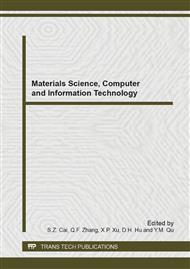p.1751
p.1756
p.1762
p.1766
p.1770
p.1775
p.1779
p.1782
p.1786
An Algorithm of Uncertain Reasoning Considering Subjective Factors
Abstract:
An algorithm of uncertain reasoning which more than one result of a new object can be obtained according to the known knowledge is an important part of an expert system. A new object is an especial decision rule which has only a predecessor. In order to resolve the problem that the differences of attributes’ importance in the new object are not considered in traditional methods of uncertain reasoning, a new uncertain reasoning algorithm based on the rules set which is obtained on the basis of the rough set theory is proposed. In the algorithm, both subjective factors and objective factors in the process of reasoning are considered, and the proportion of subjective factors to objective factors can be controlled by users. So the algorithm is better than the tradition method in flexibility and practicability.
Info:
Periodical:
Pages:
1770-1774
Citation:
Online since:
July 2014
Authors:
Price:
Сopyright:
© 2014 Trans Tech Publications Ltd. All Rights Reserved
Share:
Citation:


